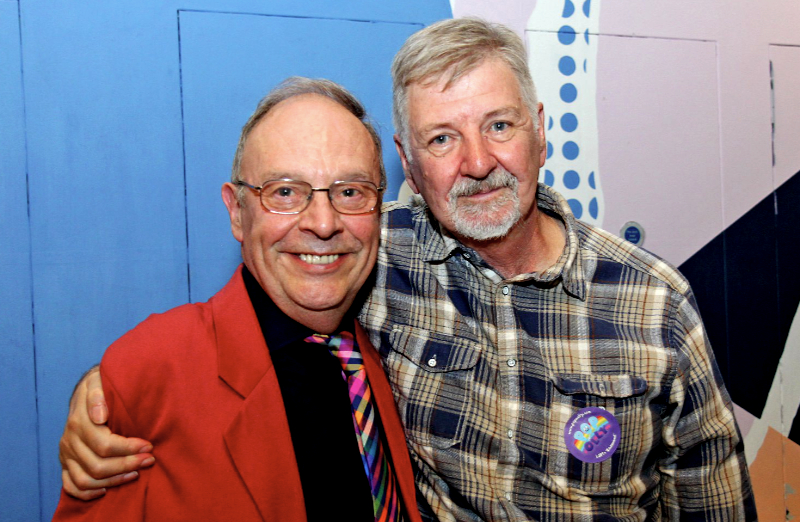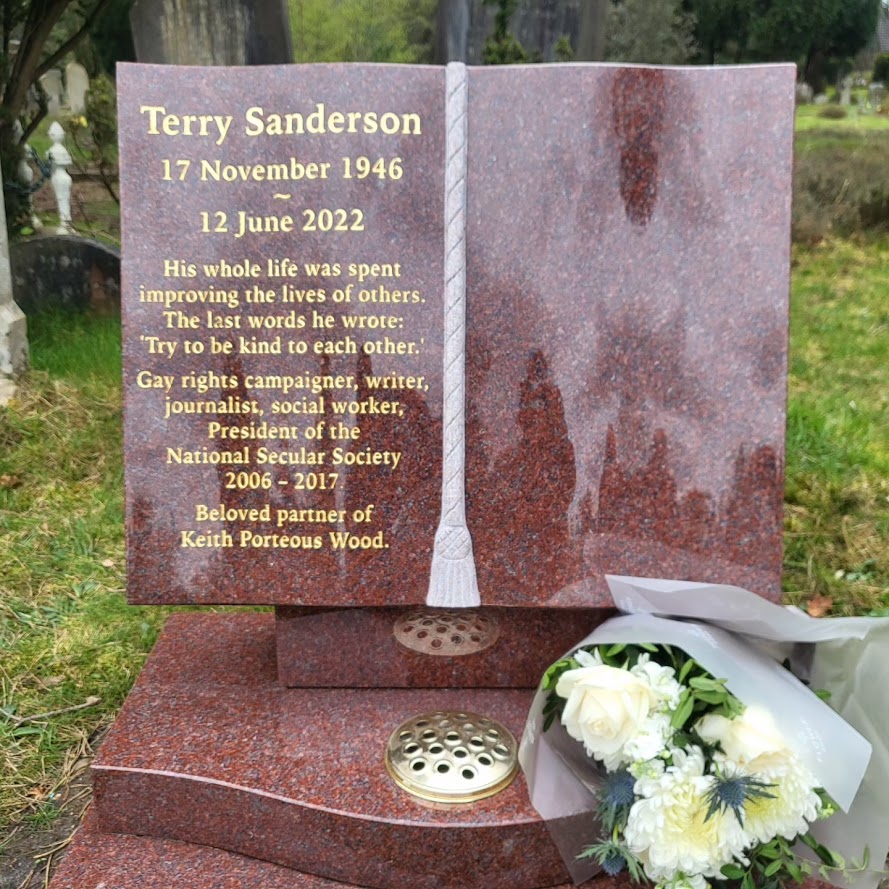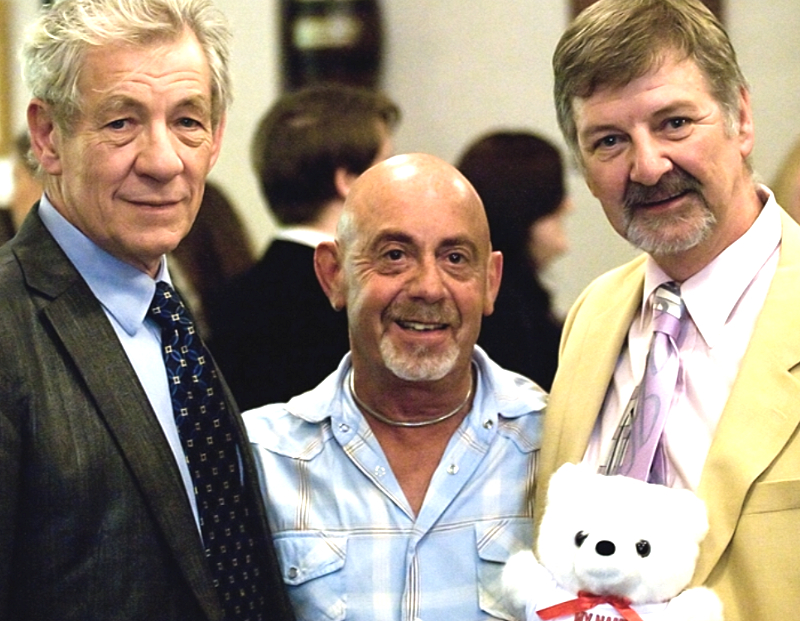
Image via Facebook
TERRY SANDERSON’S partner of more than 40 years —Keith Porteous Wood, above left—this week provided the Pink Triangle Trust with a report of a ceremony he led that took place last month to following Terry’s death on June 12, 2022 at home in London.
Terry’s gravestone at Brookwood cemetery, close to that of the NSS’s founding President, Charles Bradlaugh, records: “Gay rights campaigner, writer, journalist, social worker, and President of the National Secular Society 2006-2017.”

Photo credit: Marco Tranchino. You can view more images of the ceremony here.
Terry died, aged 75, from cancer. He was born in the mining village of Maltby in South Yorkshire in 1946.
Last year, Terry’s ashes were interred there in a private ceremony. Both ceremonies were followed, as Terry would have wished, by a delicious meal.
Numerous tributes have been paid to him and obituaries written for Media Watch, a collection of Terry’s columns which appeared in Gay Times over a period of almost 25 years. He reported on and examined the way LGBT issues were covered by the mainstream media.
The grave takes the form of an open book in tribute to his brilliance as a writer, recording that “he spent his whole life trying to improve the lives of others” and the last words he wrote: “try to be kind to each other”. This phrase came from his unflinching Facebook posting announcing his imminent demise.
The posting provoked an immediate outpouring of love and admiration. Few hear such words about themselves as they are reserved for funerals.
I drew attention to the intense poverty of Terry’s childhood; the family routinely pawned the stair carpet as it was their most valuable asset. His first appearance on stage at school was marred by one of his shoes disintegrating.
His exceptional writing talents emerged early, as shone out from his school exercise books. He staged informal plays with children in the neighbourhood.
Not for him the insularity of Maltby. In his early twenties, cashing in his savings and pension pot, he visited his brother in Rhodesia (now Zimbabwe), a pen friend in the US and in 1971 joined what turned out to be a group of former public school pupils on an expedition by Land Rover to Kathmandu. He only just survived dysentery.
His gay activism was legendary. He came out—even to his family—in the local newspaper. Determined to help isolated gay people, he founded a Yorkshire branch of the Campaign for Homosexual Equality, held meetings, set up a telephone helpline, and distributed gay-related books stored in his tiny bedroom.
Rotherham council refused to permit a gay disco on council premises on the pretext that the staff would object. So he invited over a hundred gay friends to a birthday party at a council venue. The staff volunteered that the event had been more civilised than their regular discos, but of course this did not dissuade the council from still blocking them. So Terry appealed to the national ombudsman, and won.
He and I met in 1981 at a gay festival at Durham University and soon after he moved to London to live with me. In 1986 after the government introduced the notorious anti-gay Section 28, Terry started to write self-help books for gay people of which there eventually scores—a variety of titles, editions and languages. They have helped many people, including numerous famous people, to embrace their sexuality.
He was also a film director manqué and compiled films, most notably one depicting the life of his hero Marlene Dietrich, with her sexual ambiguity and constantly evolving career. He emphasised her much-decorated bravery entertaining Allied troops during World War II, and, particularly given her German origins, how this infuriated the Nazi hierarchy who made repeated attempts to persuade her to change sides.
Other films were more light-hearted and he would spend months tracking down hilarious clips for yet another “best variety show ever”. Each were screened in the runup to Christmas at London’s Cinema Museum as a benefit performance, preceded by a meal with dozens of friends. His infectious humour was also employed in writing humorous books and plays.
In 1983 Gay Times accepted his suggestion for a monthly feature commenting on the media’s then gruesome treatment of homosexuality and gay people.
Mediawatch quickly became the most popular article in the magazine and it endured for 25 years making Terry their longest standing columnist. This entailed reading every newspaper for a quarter of a century, before any were online.
The information he gleaned from all this research formed the basis for his relentless complaints to the Press Complaints Commission. A former commissioner and now peer recently admitted to Keith that Terry made their life “hell”.
Over the years, the Commission took these complaints ever more seriously and imposed progressively tougher sanctions on newspapers printing homophobic articles. Not only did this materially reduce their incidence, but it also had the important consequence of removing the licence their publication had given for homophobia in everyday discourse. Now even the worst offending titles eschew such hatred and frequently publish supportive articles that would have been unthinkable even fifteen years ago.
This was Terry’s most enduring legacy.
One of the reasons that Terry and I were secularists was that we identified the churches as being a major obstacle to gay rights and equality. When the leadership of the National Secular Society became vacant in 1996, Terry persuaded me to abandon my professional career and apply for the position, to which I was appointed.
We worked together tirelessly to grow the National Secular Society, aided in no small way by Terry’s writing and broadcasting skills. Some years later Terry joined the NSS council and served as President for over a decade until he resigned because of deteriorating health.
The achievement of which Terry was proudest during his presidency was having hit on the idea of a protest at the public funding of Pope Benedict’s visit to the UK in 2004. The demonstration extended to over a mile, from London’s Hyde Park Corner to Piccadilly Circus, and no papal demonstration before or since has been remotely as large as that.

Terry presenting a petition, calling for the Pope to Pay for his visit, to No. 10 Downing Street
He was also proud of the role of the NSS in the abolition of the blasphemy law in England & Wales which took place on his watch. It had been an objective of the NSS since its foundation in 1866.
It Is astonishing that Terry achieved all of this while working full time for decades with adults with learning difficulties and for some years as an agony aunt (perhaps the only bearded one) with Claire Rayner on Women’s Own.
A further graveside tribute came from Professor Paul Johnson OBE, administrative Dean at Leeds University, who described Terry’s books as antidotes to “vile responses to people living with HIV and AIDS, and the law discriminat[ing] against the section of the community most affected by the pandemic. … How To Be A Happy Homosexual was a response to state discrimination. Its basic message was that as a gay person you can be happy, and your happiness is in your own hands.”
Prof. Johnson concluded that Terry had been “one of the UK’s greatest advocates of gay rights. His humorous ways and trenchant analysis made him one of the 20th century’s major contributors to establishing equality for LGBTQ people.”

Former Freethinker editor Barry Duke flanked by renowned British actor and atheist Sir Ian McKellen and Terry Sanderson in the wake of the Sudanese teddy bear blasphemy case of 2007. The photo, provided by the NSS, was taken in 2018 at a ‘Bye Bye Blasphemy’ party‘ held by the organisation to celebrate the tenth anniversary of the abolition of blasphemy law in England and Wales.
Stephen Evans, the NSS’s CEO, added that Terry had been a mentor. His enthusiasm for secularism and human rights, including gay rights, had been inspirational. So many had expressed their admiration of Terry and he would be sorely missed.
At the ensuing meal his favourite music was played, especially that of fellow-Yorkshireman Frederick Delius. Friends added their own anecdotes and recollections, both poignant and amusing.
Long time friend Malcolm Trahearn mentioned that Terry had commissioned a half-size mannequin of Marlene Dietrich, resplendent with a splendid white gown. It shared a place of honour with a bust of Delius in their home.
One of the social workers recalled movingly that despite Terry having retired years ago, he is still remembered by service users, such was his devotion to caring for them. He refused numerous offers of promotion to keep close to them.
Another guest recalled how Terry had been almost alone in supporting him when the then somewhat religious management of the Scout Association had stopped at nothing in persecuting him for being gay—which they maintained should disbar him from being a leader —and even more so for his proposing a revised, secular, Scout promise. Both battles are now won. Others talked of Terry’s charm, humility, kindness and courage.
The occasion was a fitting grand finale, as Terry would doubtless have smilingly dubbed it.
If you would like to support the Pink Triangle Trust’s mission to promote humanism, fight bigotry and fund LGBT groups, you can make a donation below. If you wish to report any typos or errors, please email freethinkered@aol.com
Make a one-time donation
Make a monthly donation
Make a yearly donation
Choose an amount
Or enter a custom amount
Your contribution is appreciated.
Your contribution is appreciated.
Your contribution is appreciated.
DonateDonate monthlyDonate yearly


It cannot be understated the sheer magnitude of debt which all LGBT people owe to the much-missed Terry Sanderson. A selfless and life-long advocate of equality, Terry was truly a man of heroic stature and a Secular Saint.
LikeLike